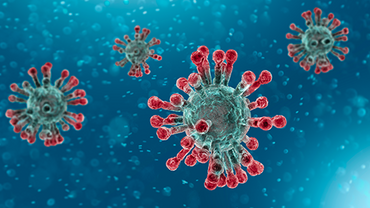ECDC updates its guidance regarding quarantine and isolation considering the rapid spread of Omicron in the EU/EEA
Considering the rapid spread of the Omicron variant of concern (VOC), ECDC is proposing options regarding quarantine and isolation, and recommendations that can be adapted and implemented by EU/EEA Member States when resources are limited and when there is high pressure on healthcare systems and other functions in society (e.g. staff shortage and reduced resources). Due to limited scientific evidence on the epidemiological characteristics of Omicron, the proposed options are not evidence based and may imply an additional risk for transmission.
The overall guidance regarding quarantine remains unchanged, but the options proposed include shorter quarantine periods in case of high and extreme pressure on healthcare systems and society as well as testing with rapid antigen detection tests to release patients from quarantine.
In the case of isolation, the clinical improvement now includes resolution of fever for 24 hours instead of three days and testing by rapid antigen detection tests to release patients from isolation. Shorter periods of isolation are also proposed in the options for essential workers in case of high and extreme pressure to healthcare and society.
Current epidemiological situation
Over the past two weeks, a steep increase in COVID-19 notification rates has been observed in several EU/EEA countries. At the end of week 52, an epidemiological situation of high or very high concern was observed in all but two EU/EEA Member States. This situation is largely driven by the continued circulation of the Delta variant and rapidly increasing spread of the Omicron variant in many countries.
Based on the current situation and the available evidence, ECDC considers that the overall level of risk to public health associated with the further emergence and spread of the Omicron VOC in the EU/EEA is very high.
In the coming weeks, the spread of Omicron is expected to result in even higher overall case notification rates. Such high levels of SARS-CoV-2 transmission may lead to high levels of absence from work including among healthcare and other essential workers and are likely to overwhelm the testing and contact tracing capacities in many EU Member States. The sheer volume of COVID-19 cases anticipated to occur are expected to place considerable strain on healthcare systems and society.
Action needed to continue addressing the pandemic
Urgent and strong action is needed to reduce transmission, to keep the burden on healthcare systems manageable, and to protect the most vulnerable in the coming months.
Vaccination remains key to address the ongoing circulation of the virus and to reduce the impact of the Delta and Omicron VOCs. Efforts to increase full vaccination uptake in individuals who are currently unvaccinated or partially vaccinated should continue, as well as the acceleration of the roll-out of booster doses.
Non-pharmaceutical interventions such as avoiding large public or private gatherings, extended use of face masks, reduced contacts between groups of individuals in social or work settings, working from home and reduced inter-household mixing need to be strengthened and sustained.
Member States should also urgently assess their acceptable levels of residual risks, current healthcare system capacities, and available risk management options (e.g. contingency and business continuity measures, surveillance and testing strategy, and quarantine and isolation policy, amongst others).






